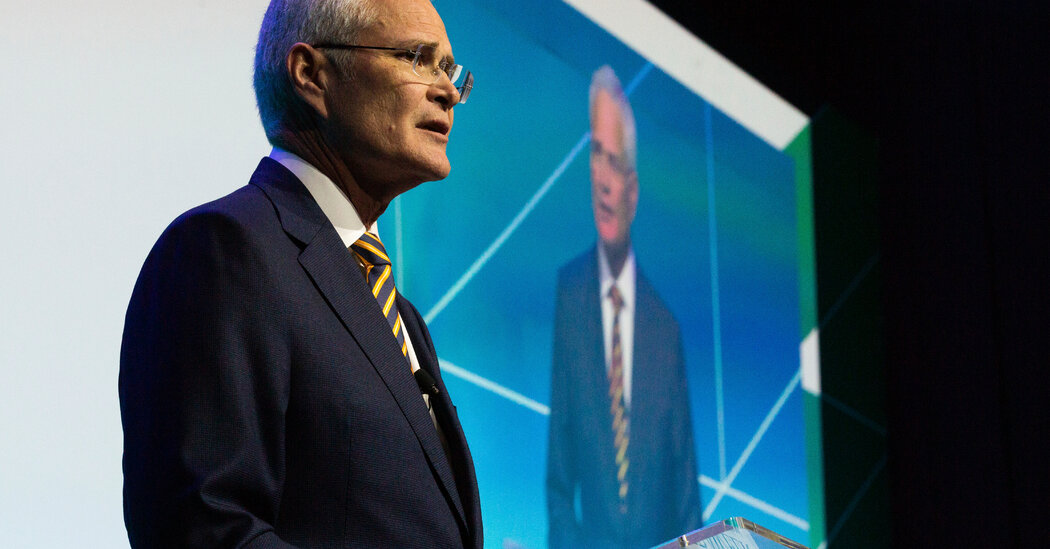Executives of six major oil and gas companies will testify before a House committee on Wednesday, which is likely to ask them tough questions about whether they are exploiting Russia’s invasion of Ukraine to make record profits by refusing to produce more energy.
In comments prepared for the hearing, the executives said they were not in the business of pushing prices and were only responding to global commodity prices that were out of their control. They also said they were moving to cleaner energy.
The hearing takes place as lawmakers in Washington battle over who is responsible for rising gasoline prices and how to balance efforts to mitigate climate change with the need for more US oil and natural gas production due to Western sanctions on Russia.
The average price for a gallon of gasoline is about $1.30 higher than a year ago, rising along with the price of oil, which is now just above $100 a barrel. That rise has become a major challenge for President Biden and the Democrats, who control both houses of Congress. Some Democrats have called on oil executives to suspend dividend hikes and share buybacks and invest more in developing alternative energy and lowering gasoline prices.
Last week, Biden said some oil companies had increased production, but added that “too many companies are not doing their part and choosing to make extraordinary profits without making additional investments to support supply.”
The outcry over oil company profits is not unusual. Politicians often criticize the energy industry for profit when gas prices rise and quietly drop their complaints when prices fall. Over the past 15 years, oil and gas prices have moved up and down in three major cycles, the most recent of which started with the coronavirus pandemic.
As vaccines became widely available and the pandemic eased, energy demand quickly recovered. But global oil production has not fully returned to pre-pandemic levels. U.S. production is just under 12 million barrels per day, about a million less than the pre-pandemic record. With oil companies adding rigs, the Department of Energy expects US production to exceed 13 million barrels next year.
Biden administration officials have urged oil companies to expand production more quickly, but Wall Street investors tell them to be more cautious because they don’t want companies setting up a storm when prices are high and only taking losses when the prices fall again. This happened between 2011 and 2015, resulting in numerous bankruptcies.
Oil companies are currently making record profits. Exxon Mobil said this week that profits could total $11 billion for the first three months of the year, the most the company has made in a quarter since 2008, when the price of a barrel of oil hit $140.
In recent years, Exxon has cut spending and its workforce, while ramping up production in the Permian Basin, which spans Texas and New Mexico and off the coast of Guyana. Darren Woods, the company’s CEO and one of the witnesses during Wednesday’s House Energy and Commerce Committee hearing, has insisted that Exxon is working to reduce greenhouse gas emissions while meeting the country’s energy needs, but that it is not responsible for the rising prices.
The war between Russia and Ukraine and the world economy
Mr. Woods will be joined at the hearing by the chief executives of BP America, Chevron, Devon Energy, Pioneer Natural Resources and Shell USA. The committee will also hear from HR McMaster, who was a national security adviser to President Donald J. Trump and is now a senior fellow at the Hoover Institution at Stanford.
“Because oil is a global commodity, Shell does not set or control the price of crude oil,” Gretchen H. Watkins, president of Shell USA, told the committee, according to prepared comments released Tuesday evening. “The current crisis and pressure on hydrocarbon stocks and prices demonstrate the urgent need to accelerate the energy transition.”
The debate over who is responsible for rising fuel prices is set outside Capitol Hill. The League of Conservation Voters this week is showing an art installation depicting a wall of oil barrels on Washington’s National Mall to highlight what it calls “the oil industry’s price push.”
Conservatives have countered that oil prices move in cycles and that after making record profits in one year, companies often lose money in other years.
“If oil companies are now pushing prices, it’s a mystery why they couldn’t do it when gas was $2.20 a gallon and they were losing money,” said Myron Ebell, director of the Center for Energy and Environment at the Competitive Enterprise. Washington Institute.

